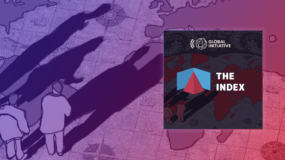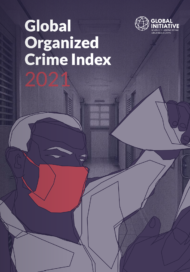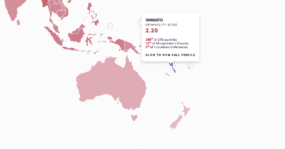The combination of its geo-strategic location, deep-seated corruption and poor resilience mechanisms has laid the ground for illicit economies to flourish, making Central America one of the world’s prime criminal hotspots. To address these dynamics and tackle the root causes that allow criminal economies to thrive, it is essential to include civil society in counter-crime responses.
Central America is one of the most crime-ridden regions in the world. It is home to countries with some of the highest homicide rates, including El Salvador and Honduras, and has become a popular trans-shipment point for drugs – particularly cocaine – en route from South America to markets in the US and Europe. According to the Global Organized Crime Index 2021, the region has the highest criminality score of all the continental subregions – 6.17 – well above the average global score for criminality (4.88).
The kinds of robust democratic institutions needed to provide a response to this are eroding across the region. The Nicaraguan president, Daniel Ortega, further cemented his grip on power, with Salvadorean leader Nayib Bukele closely following in his footsteps. Corruption runs deep among the region’s political elites and examples of high-level public officials charged with crimes (including facilitating drug trafficking) abound. The region also ranks low in the Organized Crime Index’s resilience assessments, with a score of 4.05 – the lowest for all regions in the Americas – a ranking that is dragged down by its very low score (3.44) on the Index’s ‘judicial system and detention’ indicator.
This high criminality–low resilience environment makes the region especially vulnerable to criminal dynamics becoming further embedded. Some governments have responded to the increasing threat of criminal organizations by deploying military forces, which can have the effect of feeding a cycle of crime and violence, and lead to human rights violations – all of which severely affect a country’s capacity to fight organized crime.
And the future is not looking particularly bright. While the COVID-19 pandemic has provided criminal networks with opportunities to adapt their operations, the rise in cocaine production in South America presents a particularly robust challenge to any attempt to tackle organized crime in Central America. Seven out of the eight countries in the region were assessed as having significantly influential cocaine markets in the Organized Crime Index. Cocaine is not the sole challenge: Central America also scores particularly high for other criminal markets, including human and arms trafficking, people smuggling, flora and fauna crimes, and the cannabis trade.
Alternative strategies
Over the years, a number of academics, social activists and governments have been developing strategies to tackle regional challenges posed by organized crime. Initiatives to address social exclusion by ensuring community access to high-quality education and other opportunities for marginalized individuals have been identified as essential to break the cycle of violence. However, tackling structural corruption and impunity are likely to be key to countering the effects of crime in the long run.
Some countries in the region have already tried this approach. In Guatemala, for example, a UN-backed commission worked for over a decade to dismantle the structures that allowed crime to go unpunished. The Comisión Internacional contra la Impunidad en Guatemala (international commission against impunity in Guatemala) was successful in empowering its fragile judiciary. While it was active, the commission supported investigations that led to the indictment of a former president and vice president, and the prosecution of dozens of government officials and thousands of police officers. In Honduras, a commission backed by the Organization of American States also went to great lengths to dismantle some of the structures that allow crimes – particularly those at the hands of political elites – to go unpunished.
However, these initiatives were prevented from continuing their important task. In Guatemala, the decision to not renew the international commission’s mandate came after a long smear campaign against its members, pushback from economic and political elites who were being investigated for alleged corruption. The high levels of public support for the commission and efforts by civil society groups to keep it alive were all but fruitless against this resistance. The anti-impunity commission in Honduras faced similar challenges as soon as it began investigating figures in power.
Despite their demise, these initiatives have provided two essential lessons. First, in even the most trying scenarios, it is possible for credible organizations to be established and for them to achieve important milestones, no matter how marginal. Secondly, and perhaps more importantly, they have at the very least set a precedent for positive change, which, with the right political will, could be replicated across the region.
Strong judiciaries with robust investigative capabilities are among the most essential resilience mechanisms to fight organized crime as well as smart strategies to tackle crime when it does take place, including non-punitive alternatives to current prison systems, which tend to be costly, ineffective and, ironically, serve to fuel crime. The rise in prison expenditure across the region has not made citizens safer. Investing in long-term primary-care services, crime prevention and community policing are some of the strategies that are more likely to yield positive, long-lasting results.
In addition, civil society organizations are important and transformative resilience mechanisms against crime, as identified in the Organized Crime Index. Social activists, youth workers, human rights lawyers and environment campaigners, among others, are at the forefront of the fight against crime but also the ones working side by side with communities, implementing tools and strategies to prevent criminal groups from establishing themselves and expanding throughout the territory. Yet Latin America is one of the most dangerous regions in the world for these actors. In Honduras and Guatemala, campaigning to protect natural resources can be a deadly undertaking, as is confronting the criminal organizations controlling many of the region’s profitable illicit economies.
Instead of working together with these essential actors, supporting their efforts for a common goal, authorities are increasingly targeting them. In Nicaragua, a raft of laws passed over the past two years has made the work of independent civil society organizations increasingly challenging. Things are not very different in El Salvador, where the Legislative Assembly, in which Bukele’s party holds the majority, passed an amendment criminalizing reporting on gang activities, further limiting freedom of speech.
Central America’s future looks challenging. The region’s problems are complex, but complex challenges do not always require intricate solutions. Opening an honest, open dialogue with civil society, where ideas and proposals can be shared without fear of reprisals would be a good start. These organizations and individuals are uniquely placed to provide creative and effective solutions to tackle some of the root causes of the issues afflicting the region, including – most importantly – the impunity that feeds them.
This analysis is part of the GI-TOC’s series of articles delving into the results of the Global Organized Crime Index 2021. The series explores the Index’s findings and their effects on policymaking, anti-organized crime measures and analyses from a thematic or regional perspective.
Subscribe to the dedicated newsletter to get regular updates about the project and the launch event
Una encrucijada criminal
Centroamérica es el foco de la criminalidad en América Latina. ¿Cuál es la solución?
Una ubicación altamente estratégica, corrupción arraigada y escasos mecanismos de resiliencia han sentado las bases para que las economías ilícitas florezcan, convirtiendo a Centroamérica en uno de los principales focos de criminalidad del mundo. Hay que incluir a la sociedad civil en la lucha contra estas dinámicas y abordar de raíz las causas que permiten que las economías criminales prosperen.
Centroamérica es una de las regiones del mundo más castigadas por la criminalidad. Alberga países con algunas de las tasas de homicidio más elevadas, como El Salvador y Honduras, y se ha convertido en un popular punto de transbordo de drogas – sobre todo de cocaína – desde Sudamérica hacia mercados en Estados Unidos y Europa. Según el Índice global de crimen organizado 2021, la región tiene la mayor puntuación de criminalidad de todas, 6,17, muy por encima de la media mundial (4,88).
El modelo de instituciones democráticas que podrían dar respuesta a esta situación se están debilitando en toda la región. El presidente nicaragüense, Daniel Ortega, ha consolidando aún más su control del poder y el líder salvadoreño Nayib Bukele está siguiendo sus pasos. La corrupción está muy arraigada entre las élites políticas de la región y abundan los ejemplos de funcionarios públicos de alto nivel acusados de delitos (incluida la facilitación del tráfico de drogas). Centroamérica también ocupa un lugar bajo en la puntuación de resiliencia del Índice de crimen organizado, con 4,05 – la más baja de todas las regiones de las Américas – que se ve reducida por su puntuación excepcionalmente baja (3,44) en el indicador «sistema judicial y detención».
Este entorno de alta criminalidad y baja resiliencia hace que la región sea especialmente vulnerable a que la criminalidad se arraigue aún más. Algunos gobiernos han respondido a la creciente amenaza de las organizaciones criminales desplegando las fuerzas militares de su país, alimentando a su vez un ciclo de crimen y violencia que puede llegar a violar los derechos humanos, afectando gravemente a la capacidad de los países para luchar contra el crimen organizado.
Y el futuro no es especialmente prometedor. Mientras la pandemia del COVID-19 ha brindado a las redes criminales la oportunidad de adaptar sus operaciones, el aumento de la producción de cocaína en Sudamérica supone un reto para cualquier intento de hacer frente al crimen organizado en Centroamérica. De hecho, de acuerdo con el Índice de crimen organizado, en siete de los ocho países de la región existen importantes mercados de cocaína. Centroamérica también obtiene una puntuación especialmente alta en otros mercados criminales, como la trata de personas, el tráfico de armas y personas, los delitos contra la flora y la fauna, y el comercio de cannabis.
Estrategias alternativas
A lo largo de los años, académicos, activistas sociales y gobiernos han desarrollado estrategias alternativas para hacer frente a estos problemas regionales causados por el crimen organizado. Iniciativas para abordar la exclusión social garantizando el acceso a una educación de alta calidad y otras oportunidades para comunidades marginadas se han identificado como esenciales para romper el ciclo de la violencia. Sin embargo, luchar contra la corrupción estructural y la impunidad es clave para contrarrestar los efectos de la criminalidad a largo plazo.
Algunos países de la región ya han implementado este tipo de estrategias. En Guatemala, por ejemplo, una comisión respaldada por la ONU trabajó durante más de una década para desmantelar las estructuras que permitían que ciertos crímenes quedaran impunes. La Comisión Internacional contra la Impunidad en Guatemala logró fortalecer su frágil poder judicial. Mientras estuvo activa, apoyó investigaciones que llevaron a la acusación de un expresidente y una exvicepresidenta, y de docenas de funcionarios del Gobierno y miles de policías. En Honduras, una comisión respaldada por la Organización de los Estados Americanos también logró desmantelar algunas de las estructuras que permitían que los delitos – sobre todo aquellos cometidos por las élites políticas – quedaran impunes.
Sin embargo, a estas iniciativas se les impidió continuar con su importante tarea. En Guatemala, la decisión de no renovar el mandato de la comisión internacional se produjo tras una larga campaña de desprestigio contra sus miembros, la presión de las élites económicas y políticas investigadas por presunta corrupción. Los altos niveles de apoyo público a la comisión y los esfuerzos de grupos de la sociedad civil para mantenerla viva fueron en vano. La comisión contra la impunidad en Honduras se enfrentó a retos similares tan pronto como empezó a investigar a los que estaban en el poder.
A pesar de su cese, estas iniciativas han dejado dos lecciones esenciales. En primer lugar, que incluso en los contextos más difíciles es posible establecer organizaciones creíbles y que logren hitos importantes, por pequeños que sean. En segundo lugar, y tal vez más importante, han sentado las bases para un cambio que, con la voluntad política adecuada, podría reproducirse en toda la región.
La existencia de poderes judiciales fuertes con capacidad de investigación es uno de los mecanismos de resiliencia más importantes para luchar contra el crimen organizado, así como estrategias inteligentes para hacer frente al crimen, como alternativas no punitivas a los actuales sistemas penitenciarios, que suelen ser costosos, ineficaces y alimentan la delincuencia. El aumento del gasto en prisiones en toda la región no ha hecho que los países sean más seguros. La inversión en servicios de atención primaria a largo plazo, la prevención del crimen y la vigilancia comunitaria son algunas de las estrategias que tienen más probabilidades de dar resultados positivos y duraderos.
Asimismo, las organizaciones de la sociedad civil son otro mecanismo de resiliencia importante contra la criminalidad, tal y como se identifica en el Índice del crimen organizado. Los activistas, los trabajadores juveniles, los abogados de derechos humanos y los defensores del medio ambiente, entre otros, están en la primera línea de la lucha contra el crimen, pero también son los que trabajan codo con codo con las comunidades, implementando herramientas y estrategias para evitar que los grupos criminales se establezcan y se expandan por el territorio. Sin embargo, América Latina es una de las regiones más peligrosas del mundo para estos actores. En Honduras y Guatemala, hacer campaña para proteger los recursos naturales puede ser mortal, como lo es enfrentarse a las organizaciones criminales que controlan muchas de las rentables economías ilícitas de la región.
En lugar de colaborar con estos actores esenciales, apoyando sus esfuerzos por un objetivo común, las autoridades los tienen cada vez más en el punto de mira. En Nicaragua, una serie de leyes aprobadas en los últimos dos años ha hecho que el trabajo de las organizaciones independientes de la sociedad civil sea cada vez más difícil . Las cosas no son muy diferentes en El Salvador, donde la asamblea legislativa, en la que el partido de Bukele tiene la mayoría, aprobó una enmienda que criminaliza la divulgación de información sobre las actividades de las pandillas, limitando aún más la libertad de expresión en el país.
El futuro de Centroamérica se presenta difícil. Los problemas de la región son complejos, pero los desafíos complejos no siempre requieren soluciones complicadas. Abrir un diálogo honesto y abierto con la sociedad civil, donde se puedan compartir ideas y propuestas sin temor a represalias, sería un buen comienzo. Estas organizaciones y personas están en una posición única para aportar soluciones creativas y eficaces para abordar los problemas que afligen a la región, sobre todo la impunidad que los alimenta.
Este análisis es parte de una serie de artículos de GI-TOC que profundizan en los resultados del Índice global de crimen organizado 2021. Esta serie explora los hallazgos del Índice y sus efectos en el desarrollo de políticas públicas, en las medidas contra el crimen organizado y aporta análisis desde una perspectiva temática o regional.
Suscríbete al boletín del Índice de crimen organizado de GI-TOC para recibir actualizaciones sobre el proyecto.



